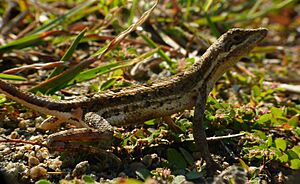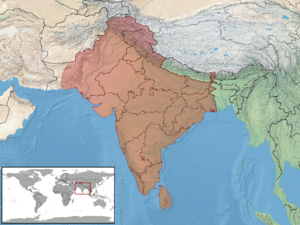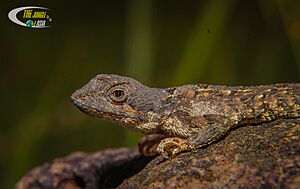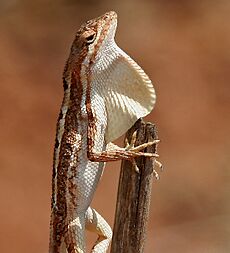Pondichéry fan-throated lizard facts for kids
Quick facts for kids Pondichéry fan-throated lizard |
|
|---|---|
 |
|
| Conservation status | |
| Scientific classification |
|
| Kingdom: | Animalia |
| Phylum: | Chordata |
| Class: | Reptilia |
| Order: | Squamata |
| Suborder: | Iguania |
| Family: | Agamidae |
| Genus: | Sitana |
| Species: |
S. ponticeriana
|
| Binomial name | |
| Sitana ponticeriana Cuvier, 1829
|
|
 |
|
| Script error: The function "autoWithCaption" does not exist. | |
Script error: No such module "Check for conflicting parameters".
The Pondichéry fan-throated lizard, also known as Sitana ponticeriana, is a type of lizard. You can find it in the eastern parts of India. It belongs to a group of lizards called agamids.
For a long time, scientists thought this lizard was found everywhere. But in 2016, new studies showed there were actually many different kinds. So, they split them into several new species. The Sitana lizards have a special scale on their back leg that other similar lizards don't have.
These lizards usually live on the ground in open, sunny spots within thin forests. If something scares them, they can sometimes run on just their two back legs!
About the Pondichéry Fan-Throated Lizard



This lizard has small, bumpy scales on its head. The scales on its back are bigger than those on its belly. Its side scales are the smallest. Its front legs are not very long. Its back legs can reach its eye if stretched forward.
The lizard is usually brown. It has a line of dark spots down its back. The spot on its neck is the darkest. There is also a light, whitish stripe along each side of its back.
Amazing Throat Fan
One of the most interesting parts of this lizard is its throat fan, also called a dewlap. This fan can be many colors, but it's often black, blue, and red. Males use this colorful fan to attract females, especially during the breeding season.
The color of the dewlap can change a lot. Some males have very bright, colorful fans. Others might have less colorful ones, or even white ones.
Size and Diet
The Pondichéry fan-throated lizard can grow up to about 8 inches (20 cm) long. Its tail makes up most of that length, about 5 inches (12.7 cm). The body itself is usually 3 to 5 inches (7.6 to 12.7 cm) long.
These lizards mostly eat insects. Their favorite foods include ants, butterfly and moth larvae (caterpillars), and termites. Scientists found these insects in most of the lizards' stomachs they studied.
Where They Live
You can find the Pondichéry fan-throated lizard in the eastern parts of India. This area is along the Coromandel Coast. It might also live in some parts of Sri Lanka.
Scientists have recently found new kinds of fan-throated lizards. For example, a new colorful species was found in coastal areas of Thiruvananthapuram. This new species was named Sitana attenboroughii after the famous naturalist David Attenborough. Another new species is called Sitana marudhamneydhal.
 | James Van Der Zee |
 | Alma Thomas |
 | Ellis Wilson |
 | Margaret Taylor-Burroughs |


